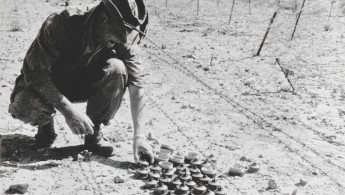Algeria leads the way towards a 'mine-free Africa' after eradicating over 8 million landmines since 2004
Algeria has destroyed over eight million landmines since 2004, revealed an Algerian military officer during an international conference on combatting and removing anti-personnel mines across Africa which concluded on Thursday in Algiers.
The mines were left by the French colonial forces shortly before they withdrew from Algeria in 1962, especially along the borders with Morocco and Tunisia.
Elias Troudi, an army officer in the Combat Engineering Corps, said that between 2004 and 2016, his country had "destroyed over eight million mines and cleared over 62,000 hectares of mine-contaminated land".
Algeria managed "after decades of struggle and effort at all levels, to completely eliminate the risks posed by anti-personnel mines, which have resulted in casualties and curbed economic and social development along the eastern and western borders of the country", he said.
The clearance was at a second stage, he said, and a previous programme had been followed between 1963 and 2004 during which military engineering units had managed to destroy over five million landmines.
During the conference, held under the theme "For a safe and mine-free Africa", a special review was made of Algeria's experience in landmine disposal and clearance in its border areas, especially with large minefields.
Algerian authorities say that over 5.6 million Algerians were killed during the French occupation of Algeria between 1830 and 1962.
— The New Arab (@The_NewArab) July 5, 2022
During Algeria's war of independence alone, it's estimated that at least 1.5m people were killed during the 8-year period.https://t.co/sUB3FI2h7D
Minister of War Veterans and Rights Holders, Laid Rebiga, said that one year after Algerian independence in 1963, the country had launched "a comprehensive plan to clear its land of anti-personnel mines, and provide health, social and psychological care for the landmine victims".
Algeria has fully implemented the national programme for mine clearance, as outlined in the 1997 Ottawa Treaty, confirmed Rebiga.
Clearance operations would allow citizens to benefit from farming the land, as well as enable the state to implement development projects which would serve the Algerian public.
Areas of land which had been out-of-bounds, and had claimed lives, would be transformed into a source of prosperity, he said.
Rebiga also said Algeria was ready to extend a helping hand to the international community in an "effective and coordinated manner" to confront the challenge of clearing the anti-personnel mines littering various parts of the world to reduce the threat they posed to human lives and economies.
Ayman Sorour, a board member of the International Campaign to Ban Landmines (ICBL), highlighted the serious problems many African countries suffer when it comes to disposing of anti-personnel mines. This relates to the lack of state funding allocated for landmine removal, as well as poor coordination between official agencies and NGOs. He called for African coordination in combatting the issue.
The bulk of Algeria's landmines date back to between 1956 and 1962 during the Algerian War of Independence. French colonial authorities had erected barbed wire fences and laid landmines along 1710 km of Algeria's eastern and western borders to prevent Algerian revolutionaries and weapons from entering from Tunisia and Morocco.
Official French reports revealed that 11 million mines were planted in Algeria, with Algerian prisoners forced to carry out the work, and that three million Algerians were displaced from their homes on the border areas in order for the French authorities to erect electric fences and lay the minefields.
On 20 October 2007, the French authorities officially handed Algeria maps showing the location of the minefields to help clear them. This followed decades in which France withheld details on the locations of the mines, severely hampering Algerian demining efforts.
Unexploded mines in Algeria led to a series of deaths and injuries every year in the eastern and western border areas.
The Algerian Association for Mine Victims states said that over four thousand people had died due to exploding mines since 1963, and thousands more have been left disabled.
In 2017 Algeria finally declared itself "anti-personnel landmine-free" and since then Algerian officials have issued a call to France to pay compensation for the landmine victims.
This is an edited translation from our Arabic edition. To read the original article click here.





 Follow the Middle East's top stories in English at The New Arab on Google News
Follow the Middle East's top stories in English at The New Arab on Google News


